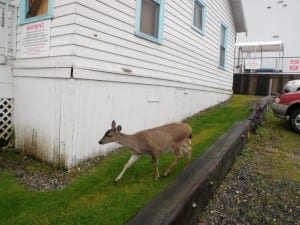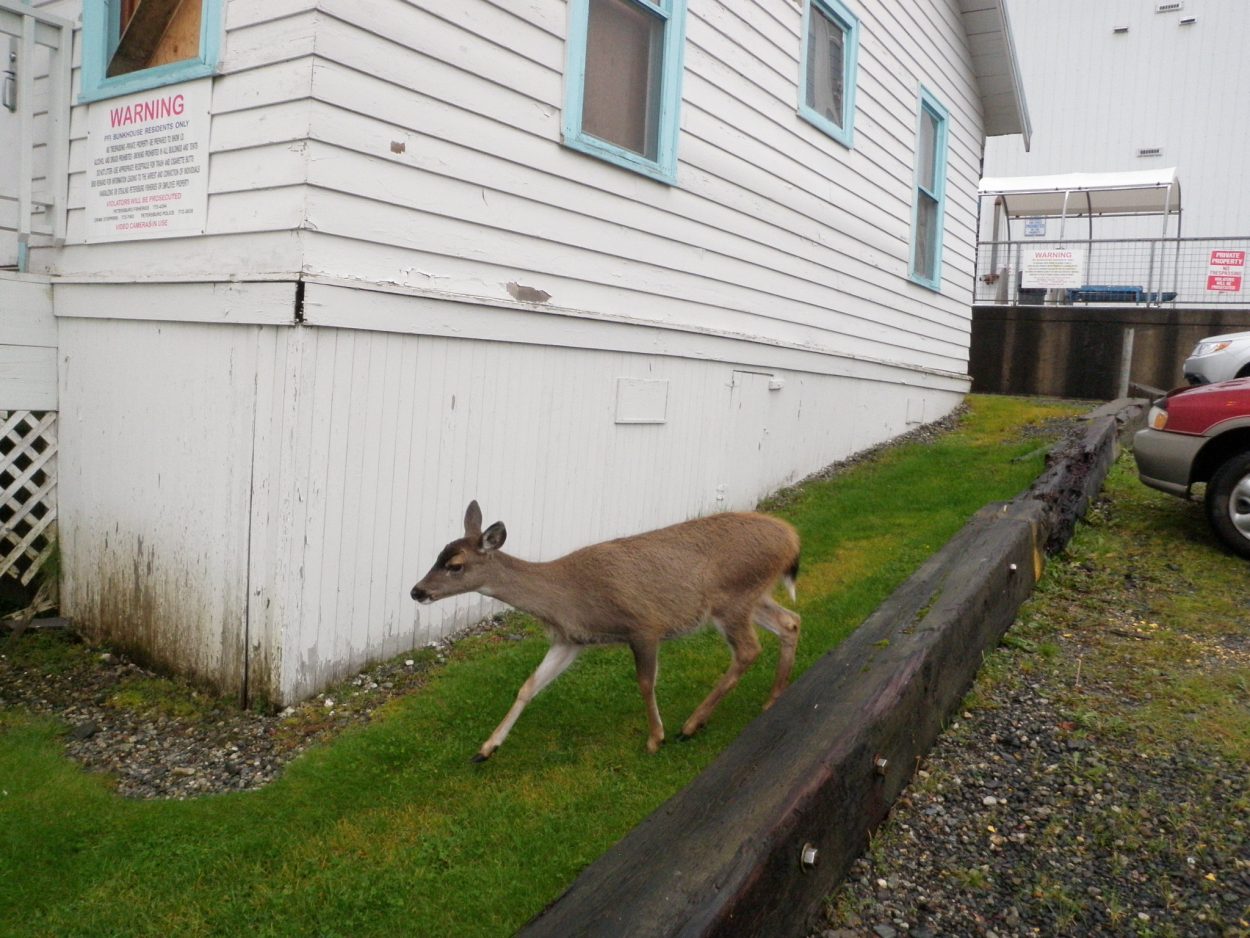Officials are considering a reduction in seasons and bag limits for federal subsistence deer hunting on the Lindenberg Penninsula of Kupreanof Island, near Petersburg. The proposed changes would mirror those made by state wildlife managers for that area earlier this year.
Audio Player
For iFriendly audio, click here:
The state is asking for the changes in federal regulations to mirror the shortened hunting time and bag limit for state hunting rules approved by the Alaska Board of Game in January. The state board reduced the four-month season which runs august through November on the Lindenberg Peninsula, down to a two-week season in the second half of October. The bag limit was also dropped from two bucks to one buck. Those are the same limits for nearby Mitkof Island, where deer numbers are also low.
At a video conferenced hearing at ranger district offices in Petersburg and Wrangell this month, Alaska Department of Fish and Game wildlife biologist Rich Lowell, explained that the Federal Subsistence Board would not normally be able to address the state request until next year. “So in effect if we didn’t take this special action request to implement out of sequence if you will, then the changes made by the Board of Game would effect be made moot because everybody here is federally qualified and would continue to operate under the federal regulations. So we felt that the situation was critical enough that we felt that we needed to take action immediately rather than wait for the federal regulatory process to catch up.”
A separate proposal has been submitted to the Federal board, which will consider making the change permanent in early 2014. The request up for a hearing this month seeks an emergency reduction for this year’s hunting season, which is set to start August 1st.

Residents of Petersburg, Kupreanof and Wrangell weighed in on both sides of the proposed hunting reduction. Kupreanof’s Dave Beebe questioned the Forest Service’s past decisions to log deer habitat on the peninsula. “Many environmental impact statements have documented and forewarned what will happen in terms of the consequences of the removal, the disproportionate removal of deer winter habitat, high volume, old growth on south, essentially south facing slopes, below elevations of 800 feet and unfortunately that’s where most of the logging is occurring.”
Becky Knight of Petersburg agreed deer numbers have not been high in that area and said it was an important food source for her family. “I support the board of game action as well as this proposed federal action to bring that season in line with the state season, not only because it is the right thing to do for the resource but to avoid confusion by hunters,” she said. “My support is accompanied with sadness because the situation was entirely preventable had there been a much lighter historical touch on the Lindenberg accompanied by a delay of any additional logging there until the area fully recovered.” Knight and Beebe both asked for an emergency closure of the Tonka timber sale on the Lindenberg Peninsula, a harvest of 37-million board feet off of national forest land on the island’s road system. Viking Lumber of Klawock is cutting that timber this year.
Bob Lippert of Wrangell said his biggest issue was with the federal designated hunter program. Federal law allows a qualified subsistence user to hunt on behalf of someone else with a permit, with no limit on the number of other qualified subsistence users a hunter can hunt for. “That to me is something that should be changed,” Lippert said. “There’s a great amount of potential for abuse there. It doesn’t really take into account true subsistence its just a way for people to shoot lots of deer. And I think there may be more human causes to declining deer populations that don’t have anything to do with logging which have to do with overharvesting partly because of the designated hunter rules.”
Another Wrangell resident, Austin O’Brien did not think habitat loss from logging was to blame for deer declines. He opposed the proposal for its possible impacts on Wrangell hunters.
“What happens to those displaced Petersburg hunters that are currently using that area and who will, to fill their freezers now head down towards Wrangell country and Zarembo Island in particular, is my concern, my chief concern about this proposal. So I can’t support it in its current format,” O’Brien said.
Mike Bell of Petersburg also opposed the proposal and thought the emergency was 2-3 years ago. “I guess I don’t understand why now we’re having an emergency, an emergency thing. I’m seeming more deer, I’m seeing a handful of deer across the narrows from my house on the beach, which I hadn’t seen for a few years. The guys working over there now I talked to, I mean obviously the deer population is not what it was 6-7-8 years ago, when the big winters hit but they are coming back,” he said. Bell didn’t want to lose hunting time in the early season and thought high wolf numbers were to blame for the drop in deer numbers.
Fish and Game’s Lowell said deer estimates are low in the area based on pellet counts there and several years of low hunter harvests. Lowell thinks various threats have impacted deer on that part of Kupreanof Island. “Deep snow winters, predation by wolves and bears, reductions in deer carrying capacity. Increased moose distribution and abundance and the federal designated hunter prevision as someone else pointed out there. So, there are a number of factors that are wrapped up in this decision to reduce season length and the bag limit on Lindenberg.”
The proposal for a permanent hunting reduction will be going through the Federal Subsistence board process this fall and winter – including a vetting by the subsistence Regional Advisory Council for Southeast. The issue will up for a recommendation from that group during a meeting planned in Petersburg September 24th and 25th.
In the meantime, acting district ranger Jeff Miller will make the special action decision for the upcoming season prior to the normal start of that season August 1.












